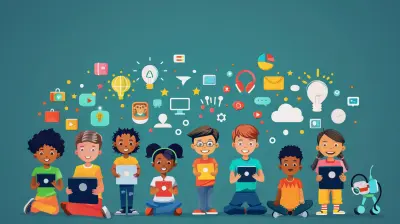Why Prior Knowledge is Essential for Reading Understanding
8 July 2025
Reading isn’t just about sounding out words or passing your eyes over a page. It’s about making sense of what you’re reading. But have you ever paused mid-paragraph and thought, “Wait, what did I just read?” Chances are, the problem wasn’t just complex vocabulary or a confusing sentence—it may have been because you lacked the background knowledge to relate the information to. That’s where prior knowledge jumps in as the unsung hero of reading comprehension.
Let’s dig a little deeper and talk about why prior knowledge is such a game-changer when it comes to truly understanding what we read.
What Exactly is Prior Knowledge?
Before we go any further, let’s get on the same page here.Prior knowledge refers to the information, experiences, beliefs, and even assumptions you already have stored in your brain before you read something new. Think of it like your mental toolbox. When you read, your brain naturally tries to connect the words you're seeing to what it already knows. If there’s more in your toolbox, you’ll likely build understanding quicker and better.
Imagine trying to read a book about quantum physics with zero understanding of basic science—it’s like trying to solve a puzzle with half the pieces missing. You might get a rough idea, but the big picture? It’s blurry at best.
Reading: More Than Just Decoding Words
Here’s a truth bomb: just being able to pronounce words doesn’t mean you understand them. You can read a sentence like, “The mitochondria are the powerhouse of the cell,” but unless you’ve heard of cells, biology, or energy production, it may not mean much.Reading comprehension demands more than vocabulary. It requires context, mental models, and that “Oh! I get it!” moment that only comes when your brain links new info with something it already knows.
Let’s break this down with a simple analogy.
Think of reading as baking a cake. The recipe (words on the page) tells you what to do, but prior knowledge is your experience in the kitchen. Without it, you might follow the instructions but have no idea why baking powder is needed or what “fold in the eggs” even means. The result? A half-baked mess.
Why Prior Knowledge Supercharges Comprehension
1. It Helps Fill in the Gaps
Writers don’t spell everything out—thankfully! Imagine how boring that would be. Instead, they rely on readers to infer meaning. But to make inferences, you need something to work with.When you already know a bit about a subject, you can connect the dots faster. You understand cues, catch references, and read between the lines.
Let’s say you’re reading a news article about inflation and interest rates. If you’ve taken a basic economics class or have followed financial news, everything makes more sense. You recognize patterns, trends, and implications. Without that background? You’re probably lost in a sea of unfamiliar terms.
2. It Boosts Memory and Retention
Here’s a fun fact from cognitive psychology: we remember new information better when we can relate it to stuff we already know. That’s how our brains are wired.Prior knowledge acts like mental glue. It helps new details stick around longer because your brain doesn’t treat them as random data—it sees them as part of a larger puzzle you’ve already partly solved.
So, when you read about something you’re vaguely familiar with, you’re actually feeding your brain something it can organize and tuck away neatly.
3. It Builds Confidence and Motivation
Struggling through text with no clue what’s going on? That’s frustrating. And for many students, especially young readers, that frustration turns into demotivation.But when a student reads about something they know—even a little—they feel more confident. They feel smart. And guess what? That encourages them to keep reading.
It’s like being at a party where you recognize a few familiar faces. You’re more likely to stick around and socialize.
The Science Behind It: Schema Theory
Okay, here’s a quick nerd moment—and it’s actually pretty cool.Psychologists use the term “schema” to describe mental frameworks we build from experience. Schema theory says that when we encounter new information, we interpret it through these frameworks.
So, if you already have a schema for “volcanoes,” and you read a story about an island with a rumbling mountain, your brain immediately starts interpreting the clues. You expect lava, eruptions, maybe even evacuation.
Without that schema? The same story might feel vague or confusing.
That’s why prior knowledge isn’t just helpful—it’s essential. Comprehension isn’t passive; it’s a mental dance between old knowledge and new information.
Real-Life Examples: Where It Makes All the Difference
Let’s take a look at some everyday situations where prior knowledge can make or break reading understanding.Reading Literature
Ever tried reading Shakespeare without knowing the historical context of Elizabethan England or the complicated social norms of the time?You can understand the literal meaning of the words, sure. But the deeper themes, character motivations, and symbolism? They’re way easier to grasp when you have a little background in your back pocket.
Reading News Articles
Imagine picking up an article about climate change, energy policy, or international relations. Without any idea of the key players, past events, or basic science, it’s just a blur of technical jargon and endless quotes.A reader with background knowledge can skim through and say, “Aha, this is similar to what happened in 2022,” or “Oh, I remember reading about that law.”
Reading Textbooks
In academic settings, students often get overwhelmed by textbook chapters stuffed with details. Prior knowledge lets you anchor those facts into a bigger picture.Ever wonder why students who keep up with lectures find reading easier? It’s not just repetition. It’s because their brains already have a framework to absorb and pin the new info onto.
How to Build Prior Knowledge (Even If You Feel You Have None)
Here’s the good news: you don’t need a PhD or years of experience to gain useful prior knowledge. You just need curiosity and a little consistency.1. Read Widely and Often
Don’t stick to one genre or topic. Read articles, blogs, fiction, news, whatever grabs your attention. The more varied your reading, the richer your mental library becomes.2. Watch Documentaries and Educational Videos
Sometimes watching a 10-minute video can give you a foundational understanding that makes reading about that topic a breeze.3. Have Conversations
Talk to people. Ask questions. Join discussions. We often pick up background knowledge just by being engaged and curious.4. Make Connections
When you learn something new, try relating it to what you already know. Think of it like adding a new branch to your existing knowledge tree. This practice strengthens your mental scaffolding.How Teachers and Parents Can Help
If you’re an educator or a parent, helping kids build prior knowledge is one of the most powerful things you can do to support their learning journey.Here’s how:
- Pre-teach vocabulary and concepts before diving into a new topic.
- Use visuals and real-world examples to make abstract ideas relatable.
- Encourage curiosity by letting students explore topics they’re passionate about.
- Create connections between old lessons and new material. “Remember when we talked about weather last month? Well, tornadoes are just one extreme form of weather…”
Final Thoughts: It’s All About Making Meaning
Reading isn’t just an academic skill—it’s a life skill. And understanding what we read is really about making meaning. The more you know going in, the easier it is for your brain to do its job.Prior knowledge acts like a guide, a translator, and even a detective, helping us uncover the full story hidden within the words. Without it, reading can feel like trying to find your way in the dark. With it? You’ve got a flashlight, a map, and a pretty solid sense of direction.
So whether you’re a student, a teacher, a parent, or just someone looking to make better sense of what you read—remember this: the more you bring to the table, the more you take away.
all images in this post were generated using AI tools
Category:
Reading ComprehensionAuthor:

Monica O`Neal
Discussion
rate this article
2 comments
Hazel Yates
Great article! Your insights on the role of prior knowledge in reading comprehension are spot on. Understanding how background knowledge enhances learning can truly empower educators and students alike. It's a reminder that building connections is key to unlocking new information. Keep up the fantastic work!
November 8, 2025 at 11:47 AM

Monica O`Neal
Thank you for your thoughtful comment! I'm glad you found the insights valuable. Building connections truly is crucial for effective learning!
Zariah Soto
Like a well-seasoned pizza, prior knowledge adds flavor to reading! Without it, you’re just eating plain dough. 🍕📚
July 15, 2025 at 4:47 AM

Monica O`Neal
Absolutely! Prior knowledge enriches comprehension, just as seasoning enhances flavor. It transforms reading into a fulfilling experience! 🍕📚


